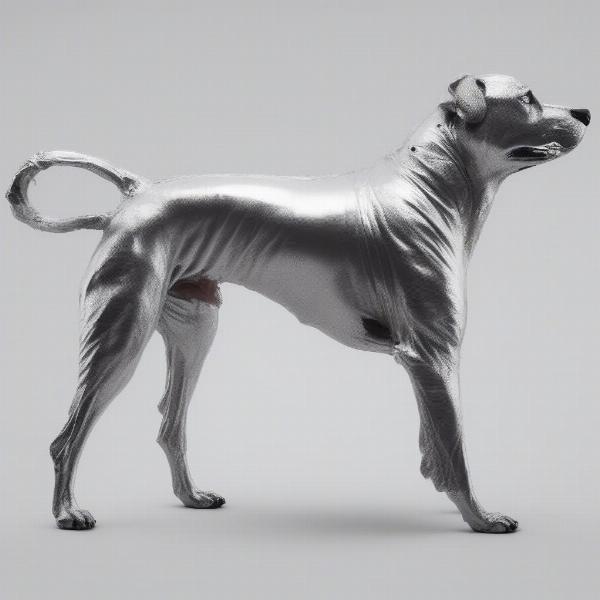If your dog ate aluminum foil, you’re likely feeling worried. This is a common concern for dog owners. While a small amount of foil might pass through without incident, larger amounts or crumpled pieces can cause serious issues. Knowing what to do next is crucial. This article will cover the potential dangers, symptoms to watch out for, and the steps you should take if your dog ingests aluminum foil.
Why is Aluminum Foil Dangerous for Dogs?
Aluminum foil isn’t digestible. If swallowed, it can obstruct your dog’s digestive tract, leading to vomiting, constipation, or even worse, a blockage requiring surgery. Sharp edges can irritate or cut the lining of the stomach and intestines. Additionally, the foil can react with stomach acid, potentially causing further gastrointestinal upset.
Symptoms to Watch For
If your dog ate aluminum foil, watch for these signs:
- Vomiting
- Loss of appetite
- Lethargy
- Whining or discomfort
- Constipation or difficulty defecating
- Changes in behavior, such as pacing or restlessness
- Abdominal pain
 Dog showing signs of discomfort after eating aluminum foil
Dog showing signs of discomfort after eating aluminum foil
What to Do if Your Dog Ate Aluminum Foil
If you suspect your dog has ingested aluminum foil, contact your veterinarian immediately. Do not induce vomiting unless specifically instructed to by your vet. The size and shape of the foil can make vomiting dangerous, potentially causing further damage. Your vet will assess the situation and advise on the best course of action.
Providing Information to Your Vet
When you contact your veterinarian, provide the following information:
- The approximate amount of foil your dog ate.
- When the ingestion occurred.
- Any symptoms your dog is exhibiting.
- Your dog’s breed, age, and weight.
This information will help your vet determine the severity of the situation and recommend appropriate treatment.
Preventing Future Incidents
Prevention is key. Store aluminum foil and other potentially harmful items securely out of your dog’s reach. Be mindful when using foil in the kitchen, cleaning up any scraps immediately. Training your dog basic obedience commands, such as “leave it,” can also be helpful in preventing them from scavenging and eating things they shouldn’t.
Conclusion
Discovering your dog ate aluminum foil can be alarming. By understanding the risks, recognizing the symptoms, and acting quickly, you can help ensure your furry friend’s safety. Remember, contacting your veterinarian is the most important step you can take if your dog ingests foil or any other non-food item.
FAQ
- Can a small piece of aluminum foil kill a dog? While a small, smooth piece might pass through without causing harm, it’s best to contact your vet for advice even if your dog seems fine.
- What if my dog ate aluminum foil days ago and is now showing symptoms? Contact your veterinarian immediately. Delayed symptoms can indicate a serious issue.
- How can I prevent my dog from eating things off the floor? Train your dog basic obedience, keep potentially harmful items out of reach, and supervise them closely, especially in areas where food is prepared or stored.
- Can aluminum foil cause poisoning in dogs? While not technically poisonous, aluminum foil can cause blockages and other gastrointestinal problems.
- Is surgery always required if a dog eats aluminum foil? Not always. Your vet will determine the best course of treatment based on the individual circumstances.
Related Articles
ILM Dog is your trusted global resource for expert canine care and advice. From breed selection to senior dog care, we offer practical, up-to-date information to help you navigate every stage of your dog’s life. We cover a range of topics including dog health, training, nutrition, and grooming. For personalized guidance on your dog’s health and wellbeing, contact us at [email protected] or +44 20-3965-8624. ILM Dog is here to help you give your furry companion the best life possible.